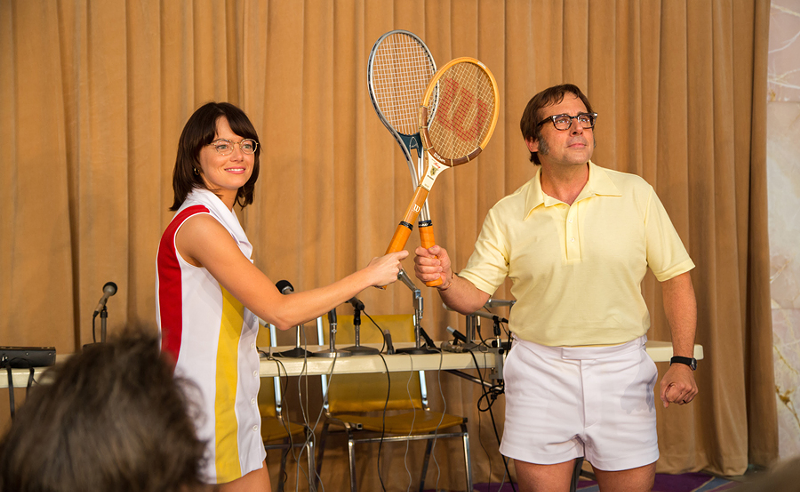In Battle of the Sexes, directors Jonathan Dayton and Valerie Faris (Little Miss Sunshine) present the true story of the highly promoted 1973 exhibition match between the top women’s tennis player, Billie Jean King (Emma Stone), and a former men’s champion, Bobby Riggs (Steve Carell), who had become a gambling addict far more attracted to showmanship than mere winning or losing.
Battle of the Sexes sets the stage for this epic first volley in an intersectional cultural war — in this case, women’s struggle for equality and economic parity — still being waged today on multiple fronts. It does so by zeroing in on the gradual realization of those involved in the high stakes at play.
In 1973, the 55-year-old Riggs — a tennis champion in the 1940s — decided to challenge 29-year-old King, the top player in the newly emerging Women’s Tennis Association. He figured such a “battle of the sexes” would make money. His claims that women tennis players were inferior to men made the event a cultural phenomenon at a time when the women’s movement was gaining strength.
At the start of Battle of the Sexes, we see Stone’s King firmly in charge of the women’s game. She is the champion, lording over her court, but she’s also aware of the power and responsibility that comes with the crown. When faced with a challenge from Jack Kramer (Bill Pullman), the head of the governing U.S. Lawn Tennis Association, to accept far lesser pay for tournaments than the male players received — despite selling as many tickets — King and her manager Gladys Heldman (Sarah Silverman) storm into the private men’s club area to protest. Right on the spot, they declare they are willing to strike off on their own rather than continue to play for less pay.
Gathering a strong yet somewhat in-the-dark sisterhood of players, King and Heldman form what would become the Women’s Tennis Association and barnstorm around the country promoting the women’s game, selling tickets and posing for pictures with mothers and daughters. In these scenes, there is wholesomeness to their grassroots approach that dovetails with the blossoming feminist movement.
But when King encounters Marilyn Barnett (Andrea Riseborough), a Los Angeles hairdresser who sees and appreciates in King something more than just her talents at tennis, things shift. Is King still the champion of women seeking equality in life beyond the kitchen and the bedroom, or is she also ready to take on the rigid institution of marriage itself? Dare she acknowledge loving someone other than her husband, the genial Larry King (Austin Stowell), who — as portrayed — is more business partner than life mate, anyway? This ensuing battle with Riggs, then, has to do with far more than tennis.
Carell’s Riggs keeps the antics and the banter light enough to avoid alienating potential television viewers of the match. While we gain some insight into Riggs’ personal life, we don’t truly get to see all the dimensions of the larger social impact of his tennis showdown with King.
To be honest, the film never completely addresses how men — regular white men of the times — felt about the issue of feminism. Riggs proudly broadcasted his male chauvinistic rhetoric like it was gospel truth, and men like Kramer lorded over the country with the patronizing air of privilege. But Battle of the Sexes makes us feel like maybe we’re missing something larger in its translation of the period.
And that hurts. In this battle, women’s rights were treated like a silly joke, a punch line, for a clownish old man who forgot to slap on his painted face and big red nose before stepping in front of the cameras. But in light of the ongoing protests of modern athletes, sparked by politicized tweets from another outsized personality, it seems unlikely everyone at the time was able to laugh so easily at those earlier slights as this film makes it seem they did.
Stone and Carell grant us access to a few behind-the-curtain moments in the lives of King and Riggs. But this Battle of the Sexes is not deep enough to speak truth to the enduring powerful impact this match had then and continues to have, now that sports again is a battleground in our never-ending cultural wars. (Opens Friday.) (PG-13) Grade: B






